WASHINGTON: The Justice Department announced criminal charges Tuesday against Hamas leader Yahya Sinwar and other senior militants in connection with the Oct. 7, 2023, rampage in Israel, marking the first effort by American law enforcement to formally call out the masterminds of the attack.
The seven-count criminal complaint filed in federal court in New York City includes charges such as conspiracy to provide material support to a foreign terrorist organization resulting in death, conspiracy to murder US nationals and conspiracy to finance terrorism. It also accuses Iran and Lebanon’s Hezbollah of providing financial support, weapons, including rockets, and military supplies to Hamas for use in attacks.
The impact of the case may be mostly symbolic given that Sinwar is believed to be hiding in tunnels in Gaza and the Justice Department says three of the six defendants are believed now to be dead. But officials say additional actions are expected as part of a broader effort to target a militant group that the US designated as a foreign terrorist organization in 1997 and that over the decades has been linked to a series of deadly attacks on Israel, including suicide bombings.
The complaint was originally filed under seal in February to give the US time to try to take into custody then-Hamas leader Ismail Haniyeh and other defendants, but it was unsealed Tuesday after Haniyeh’s death in July and other developments in the region lessened the need for secrecy, the Justice Department said.
“The charges unsealed today are just one part of our effort to target every aspect of Hamas’ operations,” Attorney General Merrick Garland said in a video statement. “These actions will not be our last.”
The charges come as the White House says it is developing a new ceasefire and hostage deal proposal with its Egyptian and Qatari counterparts to try to bring about an agreement between Israel and Hamas to end the nearly 11-month war in Gaza.
A US official, who was not authorized to talk publicly about the case and spoke on condition of anonymity, told The Associated Press there was no reason to believe the charges would affect the ongoing negotiations.
National security spokesman John Kirby said the recent “executions” of six hostages, including one American, Hersh Goldberg-Polin, by Hamas underscore “the sense of urgency” in the talks.
“We are investigating Hersh’s murder, and each and every one of the brutal murders of Americans, as acts of terrorism,” Garland said in the statement. “We will continue to support the whole of government effort to bring the Americans still being held hostage home.”
Sinwar was appointed the overall head of Hamas after the killing of Haniyeh in Iran and sits atop Israel’s most-wanted list. He is believed to have spent most of the past 10 months living in tunnels under Gaza, and it is unclear how much contact he has with the outside world. He was a long-serving Palestinian prisoner freed in an exchange of the type that would be part of a ceasefire and hostage release deal.
Haniyeh was also charged.
Other Hamas leaders facing charges include Marwan Issa, deputy leader of Hamas’ armed wing in Gaza, who helped plan last year’s attack and who Israel says was killed when its fighter jets struck an underground compound in central Gaza in March; Khaled Mashaal, another Haniyeh deputy and a former leader of the group thought to be based in Qatar; Mohammed Deif, Hamas’ longtime shadowy military leader who was thought to be killed in an Israeli airstrike in southern Gaza in July; and Lebanon-based Ali Baraka, Hamas’ head of external relations.
The charges are “yet another tool” for the US to respond to the threat Hamas poses to the US and its ally Israel, said Merissa Khurma, Middle East program director at the Wilson Center think tank in Washington.
“If Sinwar is found and brought to justice for planning the October 7 attacks, it would be a significant win for the US and for all those who lost loved ones,” she said by email.
However, with Sinwar in hiding, Khurma doesn’t see the charges adding more pressure on Hamas. She noted that the chief prosecutor of the world’s top war crimes court sought arrest warrants for Hamas leaders like Sinwar and it didn’t change their behavior or weaken them in the ceasefire negotiations.
She said the case was still important for the US because many of those killed or kidnapped were Americans and because the country doesn’t recognize the International Criminal Court.
During the Oct. 7 attacks, militants killed some 1,200 people, mostly civilians, and took about 250 people hostage. Roughly 100 hostages remain, a third of whom are believed to be dead.
The criminal complaint describes the massacre as the “most violent, large-scale terrorist attack” in Hamas’ history. It details how Hamas operatives who arrived in southern Israel with “trucks, motorcycles, bulldozers, speedboats, and paragliders” engaged in a brutal campaign of violence that included rape, genital mutilation and machine-gun shootings at close range.
Israel’s retaliatory offensive has killed over 40,000 Palestinians, according to Gaza’s Health Ministry, which does not distinguish between civilians and combatants in its count. The war has caused widespread destruction, forced the vast majority of Gaza’s 2.3 million residents to flee their homes, often multiple times, and created a humanitarian catastrophe.
Hamas has accused Israel of dragging out months of negotiations by issuing new demands, including for lasting Israeli control over the Philadelphi corridor along the border of Egypt and a second corridor running across Gaza.
Hamas has offered to release all hostages in return for an end to the war, the complete withdrawal of Israeli forces and the release of a large number of Palestinian prisoners, including high-profile militants — broadly the terms called for under an outline for a deal put forward by President Joe Biden in July.
Israeli Prime Minister Benjamin Netanyahu has pledged “total victory” over Hamas and blames it for the failure of the negotiations.





















